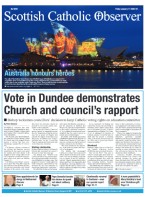April 26 | ![]() 0 COMMENTS
0 COMMENTS ![]() print
print

Counting blessings shows reasons to be thankful
This week's editorial
Anyone old enough to have been sunburned at Glasgow’s Bellahouston Park on June 1 1982—or present earlier at his youth Mass at Murrayfield Stadium in Edinburgh or at St Joseph’s, Rosewell—can vouch for the fact that Blessed John Paul II had extraordinary gifts, and that is not a reference to bringing blistering summer heat to Scotland either.
News this week that the late Polish Pope, the longest serving Pontiff in history, is a step closer to sainthood, thanks to provisional recognition of a second miracle through his intercession, has been welcomed by many Scottish Catholics, perhaps none more so than the Sisters of the Gospel of Life.
The sisters, who run the Cardinal Winning Pro-Life Initiative in Glasgow, were named after Blessed John Paul II’s encyclical letter, The Gospel of Life. They also have another connection to the late Holy Father. Sr Roseann Reddy says his 1982 visit to Scotland, when she was 18, directly helped her discern her own vocation.
Regardless of the miracles now being attributed to his intercession, and any further miracles in the future, his Papacy—which included surviving an assassination attempt—had a ‘miraculous’ impact on many Catholics and non-Catholics throughout the world, especially the young. And for that we are truly blessed and grateful.
First Minister Alex Salmond’s affirmation of the historic, present and, indeed, future, role of the Catholic Church in Scotland, in spite of our recent difficulties, was an extremely Christian although, undoubtedly, a politically astute move by the leader of the Scottish National Party. Ahead of next year’s Scottish independence referendum, when every vote will count on the SNP’s flagship policy, it makes sense for the First Minister to extend an olive branch to the dominant religious voice in the country, the Catholic Church. We are a force to be reckoned with and his Government has recently been at loggerheads with our Church in spite of earlier common ground, for example, on the preservation of Catholic education and Catholic adoption.
Indeed, we must not lose sight of the fact that the Catholic Church in Scotland, regardless of recent news or future sensationalised headlines in the secular media, remains the leading voice on many moral, social and ethical issues in our country. Our Church, although humbled, has the proverbial ‘chops,’ through millennia of experience and the Catholic teaching this has brought about, to speak out with authority from firm foundations. Be it via diplomacy or lobbying, Church teaching is not flawed even if those who deliver it—laity and clergy—struggle with human weaknesses.
With same-sex ‘marriage’ and assisted suicide legislation still to come before the Scottish Parliament, it makes sense for Mr Salmond to keep working to retain what Catholic support he may have. That said, his continued public support of the Church at a time when he could have taken advantage of its problems is gallant, mature and Christian of the First Minister.










